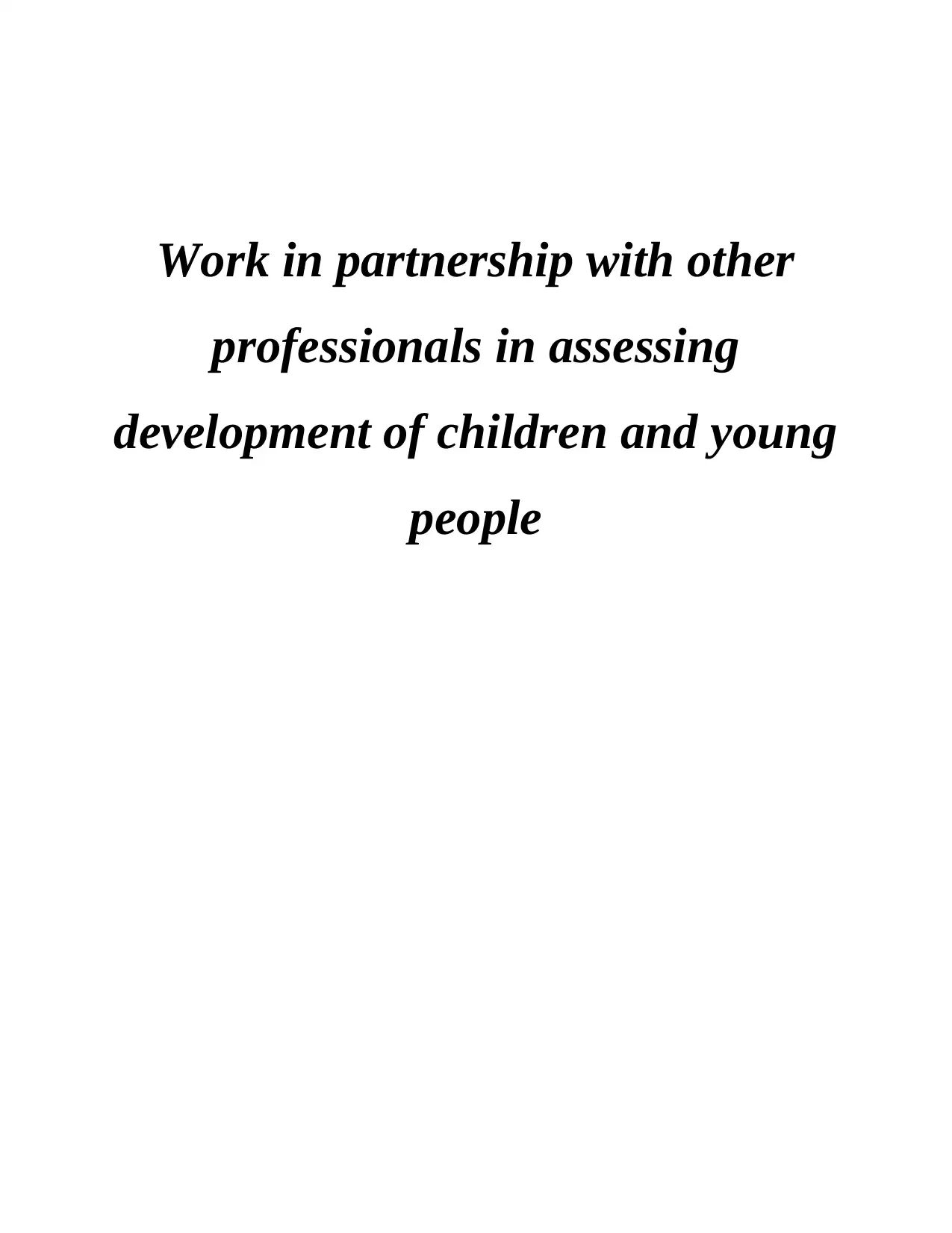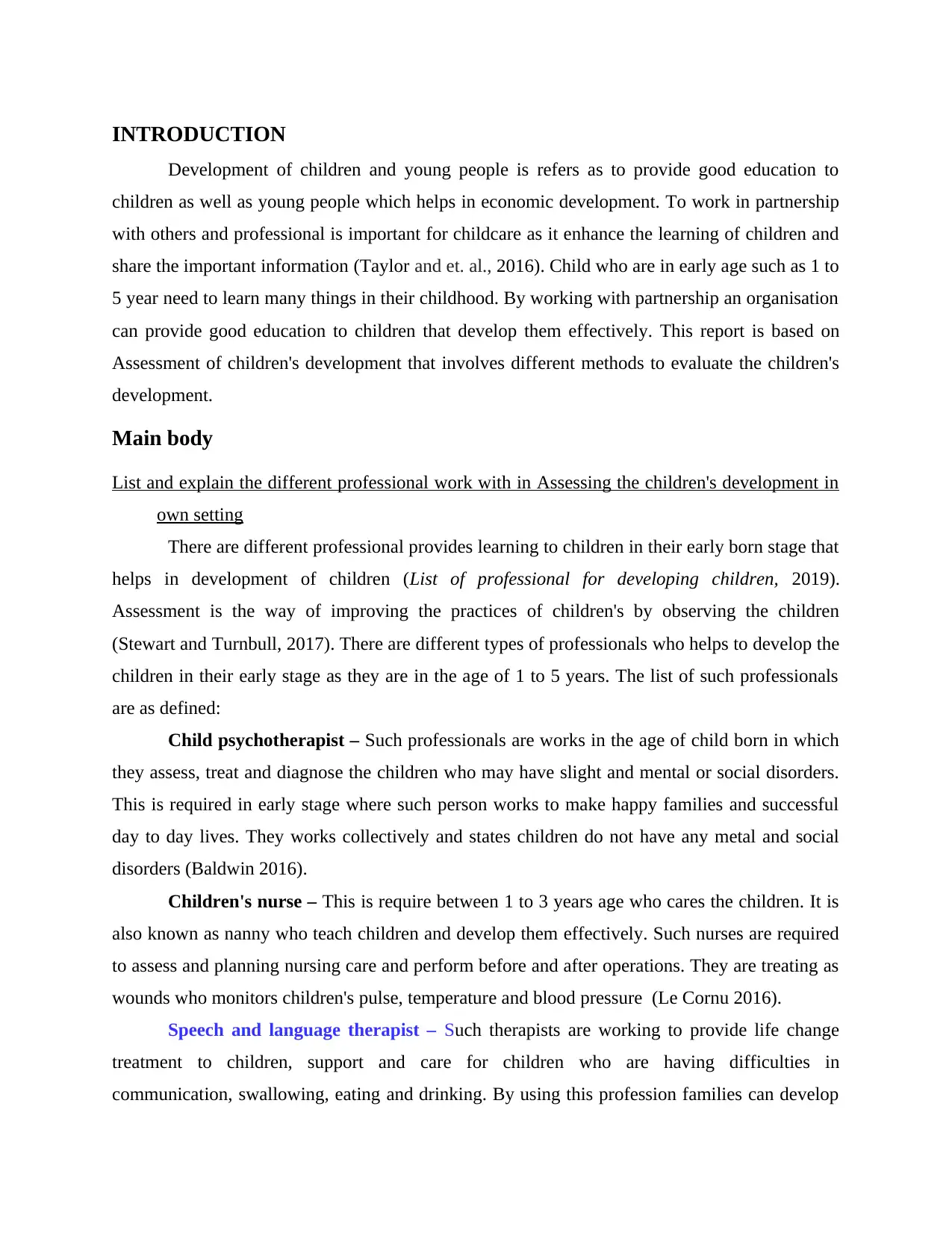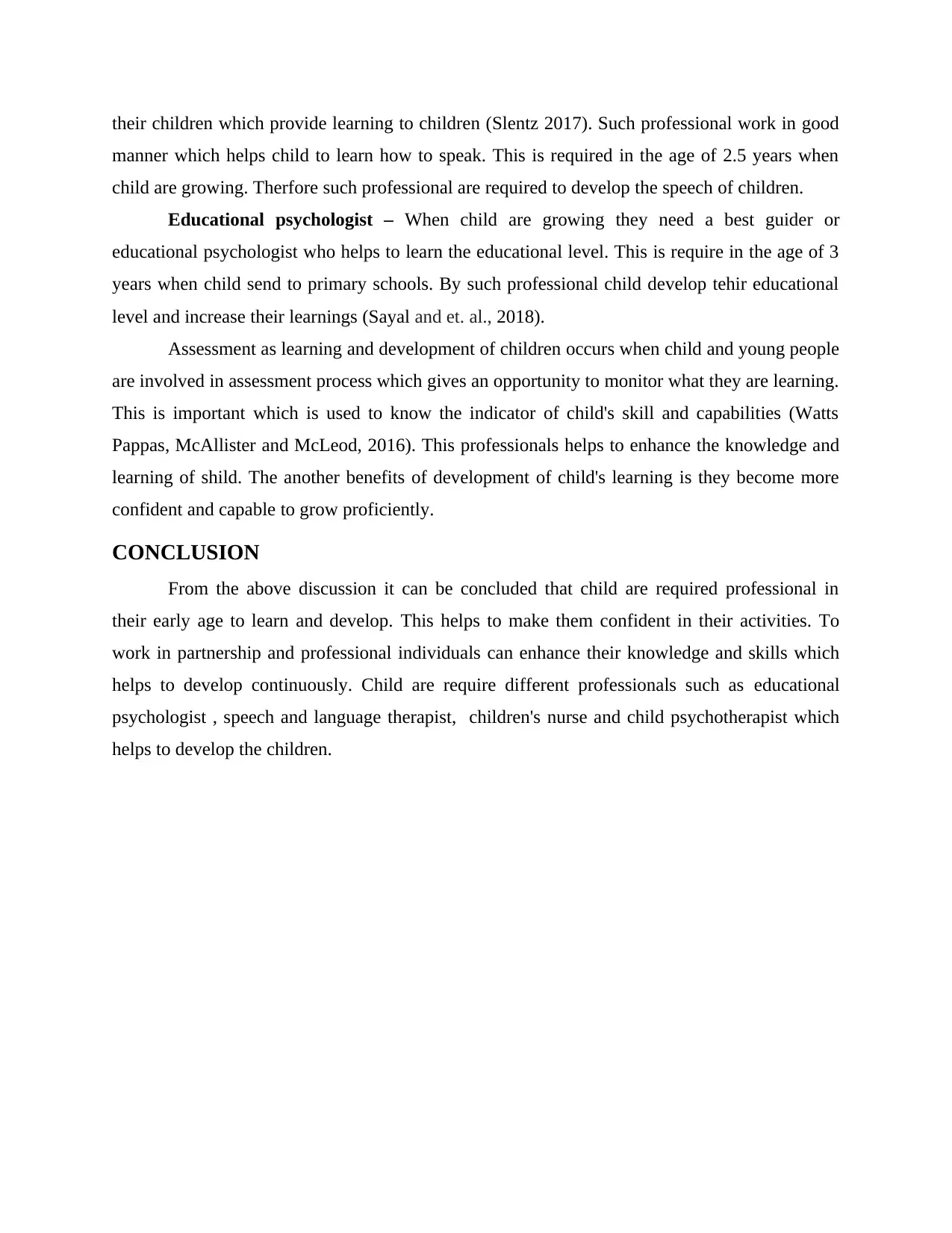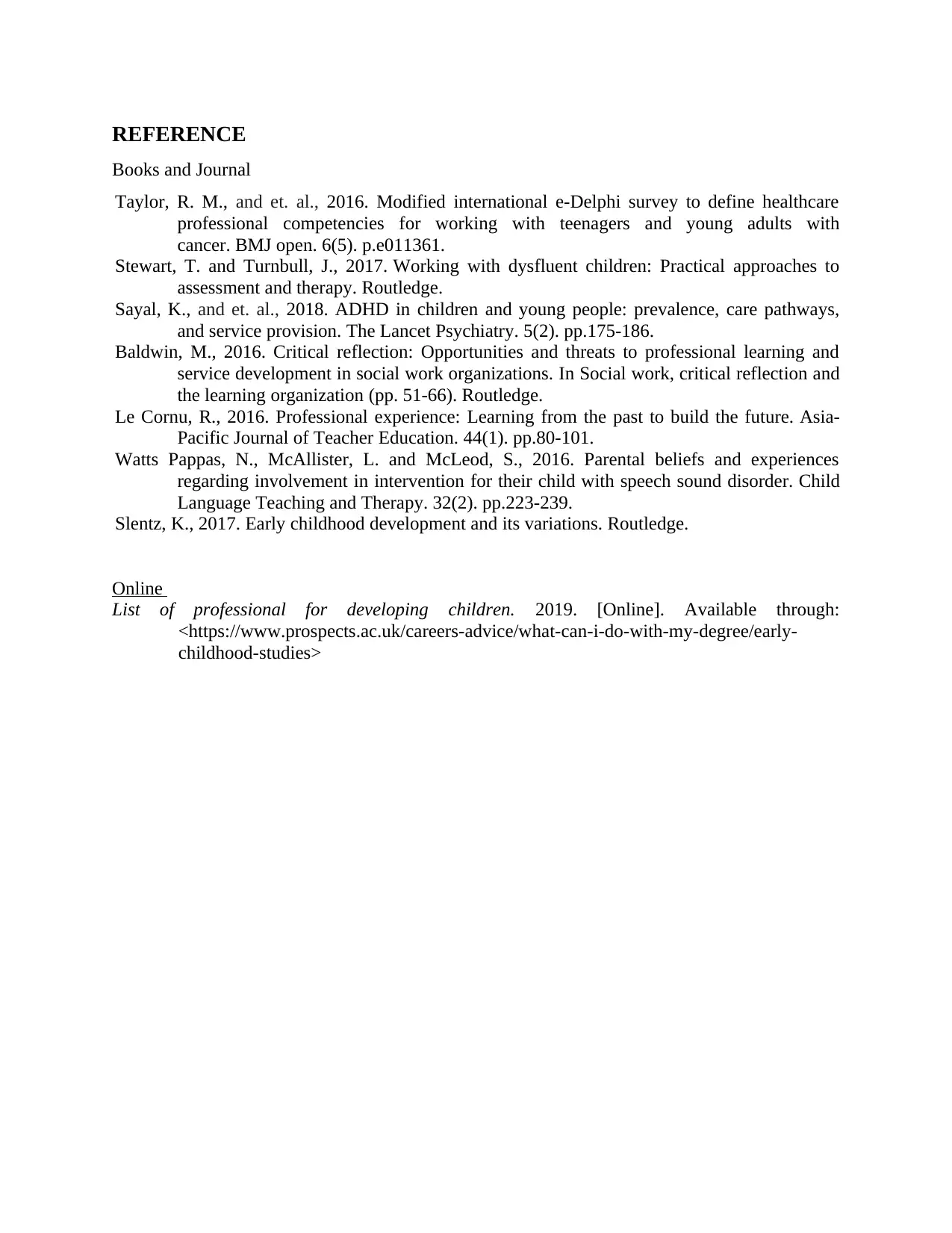Working with Professionals: Assessing Child & Young Development
VerifiedAdded on 2023/01/19
|4
|970
|45
Report
AI Summary
This report explores the assessment of child and young people's development, emphasizing the importance of partnerships with various professionals in early childhood education. It identifies professionals such as child psychotherapists, children's nurses, speech and language therapists, and educational psychologists, detailing their roles in assessing and enhancing children's skills and learning. The report highlights how these professionals contribute to a child's overall development, from addressing mental and social disorders to improving speech and educational capabilities. It concludes that collaborative efforts among professionals are crucial for fostering confident and capable children, emphasizing continuous development through enhanced knowledge and skills. Desklib provides access to similar reports and study resources for students.

Work in partnership with other
professionals in assessing
development of children and young
people
professionals in assessing
development of children and young
people
Paraphrase This Document
Need a fresh take? Get an instant paraphrase of this document with our AI Paraphraser

INTRODUCTION
Development of children and young people is refers as to provide good education to
children as well as young people which helps in economic development. To work in partnership
with others and professional is important for childcare as it enhance the learning of children and
share the important information (Taylor and et. al., 2016). Child who are in early age such as 1 to
5 year need to learn many things in their childhood. By working with partnership an organisation
can provide good education to children that develop them effectively. This report is based on
Assessment of children's development that involves different methods to evaluate the children's
development.
Main body
List and explain the different professional work with in Assessing the children's development in
own setting
There are different professional provides learning to children in their early born stage that
helps in development of children (List of professional for developing children, 2019).
Assessment is the way of improving the practices of children's by observing the children
(Stewart and Turnbull, 2017). There are different types of professionals who helps to develop the
children in their early stage as they are in the age of 1 to 5 years. The list of such professionals
are as defined:
Child psychotherapist – Such professionals are works in the age of child born in which
they assess, treat and diagnose the children who may have slight and mental or social disorders.
This is required in early stage where such person works to make happy families and successful
day to day lives. They works collectively and states children do not have any metal and social
disorders (Baldwin 2016).
Children's nurse – This is require between 1 to 3 years age who cares the children. It is
also known as nanny who teach children and develop them effectively. Such nurses are required
to assess and planning nursing care and perform before and after operations. They are treating as
wounds who monitors children's pulse, temperature and blood pressure (Le Cornu 2016).
Speech and language therapist – Such therapists are working to provide life change
treatment to children, support and care for children who are having difficulties in
communication, swallowing, eating and drinking. By using this profession families can develop
Development of children and young people is refers as to provide good education to
children as well as young people which helps in economic development. To work in partnership
with others and professional is important for childcare as it enhance the learning of children and
share the important information (Taylor and et. al., 2016). Child who are in early age such as 1 to
5 year need to learn many things in their childhood. By working with partnership an organisation
can provide good education to children that develop them effectively. This report is based on
Assessment of children's development that involves different methods to evaluate the children's
development.
Main body
List and explain the different professional work with in Assessing the children's development in
own setting
There are different professional provides learning to children in their early born stage that
helps in development of children (List of professional for developing children, 2019).
Assessment is the way of improving the practices of children's by observing the children
(Stewart and Turnbull, 2017). There are different types of professionals who helps to develop the
children in their early stage as they are in the age of 1 to 5 years. The list of such professionals
are as defined:
Child psychotherapist – Such professionals are works in the age of child born in which
they assess, treat and diagnose the children who may have slight and mental or social disorders.
This is required in early stage where such person works to make happy families and successful
day to day lives. They works collectively and states children do not have any metal and social
disorders (Baldwin 2016).
Children's nurse – This is require between 1 to 3 years age who cares the children. It is
also known as nanny who teach children and develop them effectively. Such nurses are required
to assess and planning nursing care and perform before and after operations. They are treating as
wounds who monitors children's pulse, temperature and blood pressure (Le Cornu 2016).
Speech and language therapist – Such therapists are working to provide life change
treatment to children, support and care for children who are having difficulties in
communication, swallowing, eating and drinking. By using this profession families can develop

their children which provide learning to children (Slentz 2017). Such professional work in good
manner which helps child to learn how to speak. This is required in the age of 2.5 years when
child are growing. Therfore such professional are required to develop the speech of children.
Educational psychologist – When child are growing they need a best guider or
educational psychologist who helps to learn the educational level. This is require in the age of 3
years when child send to primary schools. By such professional child develop tehir educational
level and increase their learnings (Sayal and et. al., 2018).
Assessment as learning and development of children occurs when child and young people
are involved in assessment process which gives an opportunity to monitor what they are learning.
This is important which is used to know the indicator of child's skill and capabilities (Watts
Pappas, McAllister and McLeod, 2016). This professionals helps to enhance the knowledge and
learning of shild. The another benefits of development of child's learning is they become more
confident and capable to grow proficiently.
CONCLUSION
From the above discussion it can be concluded that child are required professional in
their early age to learn and develop. This helps to make them confident in their activities. To
work in partnership and professional individuals can enhance their knowledge and skills which
helps to develop continuously. Child are require different professionals such as educational
psychologist , speech and language therapist, children's nurse and child psychotherapist which
helps to develop the children.
manner which helps child to learn how to speak. This is required in the age of 2.5 years when
child are growing. Therfore such professional are required to develop the speech of children.
Educational psychologist – When child are growing they need a best guider or
educational psychologist who helps to learn the educational level. This is require in the age of 3
years when child send to primary schools. By such professional child develop tehir educational
level and increase their learnings (Sayal and et. al., 2018).
Assessment as learning and development of children occurs when child and young people
are involved in assessment process which gives an opportunity to monitor what they are learning.
This is important which is used to know the indicator of child's skill and capabilities (Watts
Pappas, McAllister and McLeod, 2016). This professionals helps to enhance the knowledge and
learning of shild. The another benefits of development of child's learning is they become more
confident and capable to grow proficiently.
CONCLUSION
From the above discussion it can be concluded that child are required professional in
their early age to learn and develop. This helps to make them confident in their activities. To
work in partnership and professional individuals can enhance their knowledge and skills which
helps to develop continuously. Child are require different professionals such as educational
psychologist , speech and language therapist, children's nurse and child psychotherapist which
helps to develop the children.
⊘ This is a preview!⊘
Do you want full access?
Subscribe today to unlock all pages.

Trusted by 1+ million students worldwide

REFERENCE
Books and Journal
Taylor, R. M., and et. al., 2016. Modified international e-Delphi survey to define healthcare
professional competencies for working with teenagers and young adults with
cancer. BMJ open. 6(5). p.e011361.
Stewart, T. and Turnbull, J., 2017. Working with dysfluent children: Practical approaches to
assessment and therapy. Routledge.
Sayal, K., and et. al., 2018. ADHD in children and young people: prevalence, care pathways,
and service provision. The Lancet Psychiatry. 5(2). pp.175-186.
Baldwin, M., 2016. Critical reflection: Opportunities and threats to professional learning and
service development in social work organizations. In Social work, critical reflection and
the learning organization (pp. 51-66). Routledge.
Le Cornu, R., 2016. Professional experience: Learning from the past to build the future. Asia-
Pacific Journal of Teacher Education. 44(1). pp.80-101.
Watts Pappas, N., McAllister, L. and McLeod, S., 2016. Parental beliefs and experiences
regarding involvement in intervention for their child with speech sound disorder. Child
Language Teaching and Therapy. 32(2). pp.223-239.
Slentz, K., 2017. Early childhood development and its variations. Routledge.
Online
List of professional for developing children. 2019. [Online]. Available through:
<https://www.prospects.ac.uk/careers-advice/what-can-i-do-with-my-degree/early-
childhood-studies>
Books and Journal
Taylor, R. M., and et. al., 2016. Modified international e-Delphi survey to define healthcare
professional competencies for working with teenagers and young adults with
cancer. BMJ open. 6(5). p.e011361.
Stewart, T. and Turnbull, J., 2017. Working with dysfluent children: Practical approaches to
assessment and therapy. Routledge.
Sayal, K., and et. al., 2018. ADHD in children and young people: prevalence, care pathways,
and service provision. The Lancet Psychiatry. 5(2). pp.175-186.
Baldwin, M., 2016. Critical reflection: Opportunities and threats to professional learning and
service development in social work organizations. In Social work, critical reflection and
the learning organization (pp. 51-66). Routledge.
Le Cornu, R., 2016. Professional experience: Learning from the past to build the future. Asia-
Pacific Journal of Teacher Education. 44(1). pp.80-101.
Watts Pappas, N., McAllister, L. and McLeod, S., 2016. Parental beliefs and experiences
regarding involvement in intervention for their child with speech sound disorder. Child
Language Teaching and Therapy. 32(2). pp.223-239.
Slentz, K., 2017. Early childhood development and its variations. Routledge.
Online
List of professional for developing children. 2019. [Online]. Available through:
<https://www.prospects.ac.uk/careers-advice/what-can-i-do-with-my-degree/early-
childhood-studies>
1 out of 4
Related Documents
Your All-in-One AI-Powered Toolkit for Academic Success.
+13062052269
info@desklib.com
Available 24*7 on WhatsApp / Email
![[object Object]](/_next/static/media/star-bottom.7253800d.svg)
Unlock your academic potential
Copyright © 2020–2026 A2Z Services. All Rights Reserved. Developed and managed by ZUCOL.





